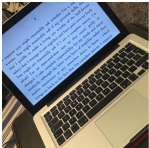
First of all, I need to make it clear that ‘self-publishing’ and ‘vanity publishing’ are not one and the same; indeed they shouldn’t even be mentioned in the same breath. A vanity publisher takes your manuscript and publishes it on your behalf. That means they technically take the financial risk on your book, distribute and market your book, and pay you a percentage of any profits. In addition, as publisher they retain the rights to your work, so that if it’s a big success the vanity publisher (potentially) makes a lot of money.
However because it’s very unlikely that your book is any good, vanity publishers offset that risk very simply: they charge the author. If you want your book to have a better chance of doing well, fine, but that means editing, proof-reading, arranging for a decent cover and so on. Each of these costs money, and the vanity publisher passes all of these costs onto the author.
That seems fair enough, but there’s a catch. Vanity publishers are highly unlikely to tell you that your book is rubbish – it’s not in their interest to do so. They want you to publish with them and to pay them a princely sum to do so. Lots of people do it, mostly folk who think their life story is intersting enough to appeal to others; mostly, those folk are plain wrong. Meanwhile, if your book is any good, the vanity publisher holds the rights. Worst of all, if you try to get out of the arrangement to go elsewhere, you might even find yourself paying a cancellation fee of some sort.
That’s why self-publishing is so much better an idea, so long as you’ve got the energy to do it. Once again there are companies that help authors self-publish, and once again they charge quite a princely sum to to do so. But you can also do a great deal of it yourself, especially if you have the energy to do all the donkey work. Self-publishing authors all know what that means: getting your book edited, proof-read, an ISBN, getting a cover designed, getting it printed, arranging distribution and publicity, and turned into an ebook amongst other things.
Here at Comely Bank Publishing we go one stage further along the do-it-yourself path. We’ve created a self-publishing collective where a group of local self-publishing authors who advise each other, help with proof-reading and other tips, and collaborate on distribution. We also set a standard; books have to be of decent quality or they don’t get our logo on the spine, and we do reject books, too. One other thing: our advice, every bit of it, is free. Unless you live locally, I’m not volunteering to help you with your book – the authors must be local for a variety of reasons – but there’s no reason why the same model wouldn’t work elsewhere. Groups of writers anywhere could form their own publishing collectives. Comely Bank Publishing would be more than happy to link with anyone trying to do the same as elsewhere.
In 2016 I can see no problem with self-publishing. Let’s face it, you're highly unlikely to make a living out of writing novels anyway, whether you do so conventionally or by self-publishing. However the more you write and get onto any sort of bookshelves, the more chance you have of eventually writing a winner.
In addition, I'd advise all authors one other thing: it looks great on your CV to be able to say you've written one or more books. It shows staying power, an ability to take a kicking, a considerable degree of drive, planning skills and the ability to see a project through to the end. Which interviewer isn’t going to be intrigued by the applicant who can say ‘published author’ on his or her application form? Ultimately, landing a better, higher-paid day job may be the quickest way to make money from your writing.
Just go for it, write your book, then write another one, then another. Better out than in.
Gordon Lawrie
 RSS Feed
RSS Feed
